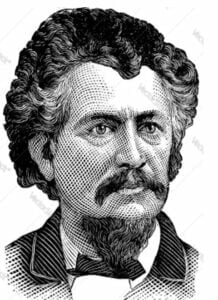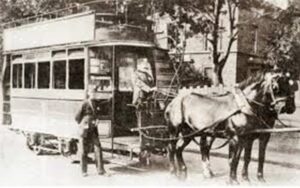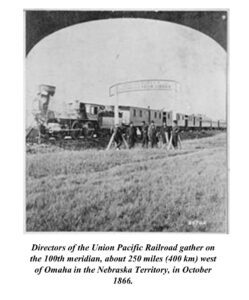
This man organised
- the first clipper to sail around the Horne,
- set up the Union Pacific Railway,
- then Trans Continental Railway.
- He came to England and set up the Horse Tramway Company.
- He was the inspiration of Jules Verne’s book Around the World in 80 days as he went around the world in 80 days, they think!
- Finally, George Train stood, unsuccessfully, for the Presidency of the United States.
This remarkable man was born in Boston in 1829, by the age of 4 he had lost his parents, and the rest of his family, to yellow fever. Brought up by his grandparents, he got involved in the transport industry, and become one of America’s most famous transport entrepreneurs of the 19th century.
He began with the shipping business, before he turned his attention to railroads and tramways.
Once he got involved with horse drawn tramways, he bought the first horse drawn tram in London running along Victoria Street in London, on rails!

This was popular with passengers, but not with officialdom, so inevitably it failed.
What was the problem?
Well, it was the rails that did it.
You see they stood proud of the road, which from George’s point of view made them easy to lay, and, of course, it was cheaper. However, they made the roads dangerous by causing havoc to horse driven coaches if they got to close.
Would you believe that this led to George being arrested for breaking and injuring the road!
The result was obvious, the tram lines had to be sunk into the road. Eventually Parliament passed legislation allowing tram lines, provided they were sunk and as long as the Tram Company agreed to pay for their installation and the upkeep of the whole road into which they were sunk.
More about George.
It was in 1870 he made the first of his three trips around the world, this time he did it in 80 days. He knew it could be done quicker as unfortunately for him, when he reached Paris, it was the time of the Paris Commune. The result was that, unluckily, he had to spent two weeks in a French jail!
What then happened to George Train?
 Well, during the civil war, before he came to England, he helped form the Union Pacific Railroad. Then in 1864, after having helped others set up the Credit Mobilier company, he left for England.
Well, during the civil war, before he came to England, he helped form the Union Pacific Railroad. Then in 1864, after having helped others set up the Credit Mobilier company, he left for England.When he got back to the U.S, he began promoting the great Union Pacific Railroad even though Vanderbilt told him it would never work. He went on to make a fortune from real estate by buying land in towns just before the railway arrived.
Oh,then among other things he stood to bePresident!
He was a bit of an eccentric, for example, in 1872 he ran as an independent candidate for President of the United States. He also financed the newspaper The Revolution, which was dedicated to women’s rights, and published by Susan B. Anthony and Elizabeth Cady Stanton.
His trips round the world
Nearly 20 years later, when he though Around the World in Eighty Days was far from forgotten, Nelly Bly, went round in 72 days. When in 1890 he learnt that Nellie Bly had been around the world in 72 days, he knew he had to do it faster. He did!
This time he went round in 67 days, a world record. Then, he went again. This time he was persuaded by the town of Whatcom in Washington State, to publicise itself, and go again. He did. This time he did it in 60 days, setting another new world record!
An amazing man who as he grew older became more and more eccentric, which was a pity.
Isn’t history fun!
10 questions to discuss:
- What was the primary industry George Train was involved in throughout his career?
- Describe the conflict around the horse-drawn tramways Train introduced in London and how it was resolved.
- How did George Train’s experience during the Paris Commune impact his first attempt at traveling the world in 80 days?
- Explain the role George Train played in the development of the Union Pacific Railroad and how it benefited him financially.
- What were some of George Train’s eccentric actions and interests beyond his entrepreneurial ventures?
- Compare and contrast the motivations and achievements of George Train and Nellie Bly in their journeys around the world.
- How did George Train’s efforts impact the popularity and accessibility of traveling around the world?
- Was George Train’s success primarily due to his business acumen, innovation, or other factors? Explain your answer.
- Do you think George Train’s legacy is overshadowed by his eccentricities, or do they play an important role in his story?
- If you could travel back in time, what question would you ask George Train about his life and accomplishments?
To learn more about him:
https://headstuff.org/culture/history/1750ad-1900ad/george-francis-train-citizen-train-60194/
https://newenglandhistoricalsociety.com/george-francis-train-one-of-few-sane-men-mad-mad-world/
https://www.tramwayinfo.com/Tramframe.htm?https://www.tramwayinfo.com/tramways/Articles/Train.htm
© Tony Dalton

